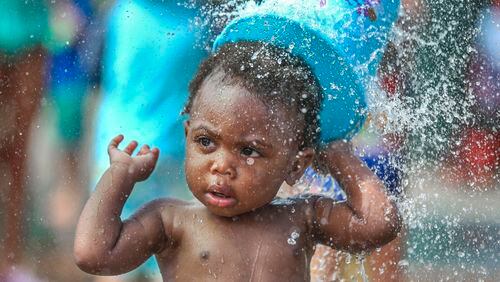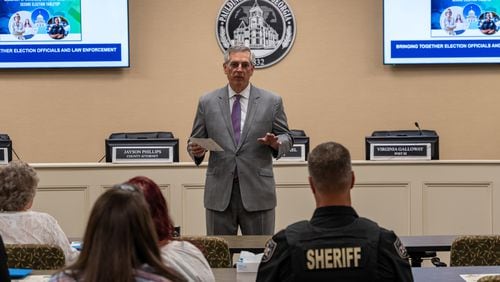Hot streaks
Six of the 10 hottest stretches of summer ever recorded in Atlanta, when the low temperature never dipped below 70 degrees, have occurred since 2005. The data goes back to 1876.
2016: 73 days
2010: 55 days
2005: 48 days
1991: 46 days
2012: 44 days
2007: 43 days
2015: 40 days
1993: 32 days
1979: 31 days
1993: 30 days
Source: Southeast Regional Climate Center
The summer of 2016 goes down as Atlanta’s second-hottest ever with its seemingly ceaseless parade of 90-plus degree days.
The nights, though, have been relatively worse.
Saturday is expected to be the first day this summer that Atlanta’s low temperature drops below 70 degrees. If so, it has been 73 days — a record — since the city felt so cool. The once-typical late-in-the-day cooling-off periods have disappeared, and if future summers mimic this year’s, then Atlantans can expect worsening weather, health and ecological problems for decades to come.
One recent study predicts that by the year 2100, Atlanta will succumb to 94 days when the high temperature is at or above 95 degrees. Current average: seven days.
Future weather, of course, is hard to predict. The summer of 2017, for example, may be cooler than 2016 due to the La Nina weather pattern newly ensconced in the Northern Hemisphere. Most climatologists, though, expect temperatures to warm over the next century, and they point to man-made carbon dioxide stifling the atmosphere as the main culprit.
“One of the hallmarks of global warming is the rise of extreme heat,” said Alyson Kenward, a senior scientist with Climate Central, an environmental research nonprofit in New Jersey. “All of a sudden the types of temperatures we think of as being pretty unusual and only happening a handful of times a year will be happening a lot more in the future.
“So the question is,” she continued, “how ready are people to face three months of 95-degree weather?”
For climatologists, summer runs from June 1 through Aug. 31. Only Atlanta’s summer of 1980 was hotter than 2016, according to National Weather Service records that date to 1887.
2016 is also shaping up as North Georgia’s second-hottest year ever, behind only 2012. Atlanta’s eight warmest years have all come since 1980, proof that Georgia is steadily — and rapidly — warming, climatologists say.
Extreme heat, like intense downpours and rising seas, is increasingly linked to global warming. Marshall Shepherd, who runs the University of Georgia’s Atmospheric Sciences Program, recently co-authored a National Academy of Sciences study that “overwhelmingly found that extreme heat events have the strongest attribution signal to climate change.”
The journal Nature Climate Change also reported last year that the high temperatures three out of every four days can be tied to global warming.
Most Atlantans can easily relate to the number of days (75 this year) when the temperature hit 90 degrees or higher at Hartsfield-Jackson International Airport and DeKalb-Peachtree Airport. Less known, but potentially of greater significance, is the number of days in a row when the low temperature hasn’t fallen below 70 degrees.
This year far surpasses 2010, the previous record-breaking year, when Atlanta registered 55 straight days without the mercury ever dipping below 70. The city’s heat is fueled by more than the Earth’s overall warming.
“In general, cities hold heat more at night because of all the concrete. It’s an urban effect,” said Pam Knox, UGA’s climatologist. “And more widespread humidity seems to be going up, and humidity tends to keep things warmer at night. You really get the coolest nights in summer when it’s dry.”
Bill Murphey is Knox’s counterpart with the state of Georgia. He’s also the state’s chief meteorologist. Murphey says the lack of wind, due to high pressure systems, also keeps Atlanta hot at night.
“We had very few, if any, air mass changes or frontal systems to help us out,” he said. “Hopefully, we’ll get some (wind) changes here in the fall and maybe get a tropical storm system to help us out as far as the dryness goes.”
Tropical Storm Hermine cooled temps and replenished reservoirs and aquifers. Yet parts of metro Atlanta and northwest Georgia still suffer “extreme drought,” according to the National Oceanic and Atmospheric Administration.
“You’re likely to see drought more frequently with higher temperatures and higher evaporation (rates) that suck more moisture out of the soil,” Knox said. “That puts more stress on plants. It probably makes more farmers convert to irrigation. So there could be water shortages.”
Warmer weather might afford farmers longer growing seasons. But high temperatures also bring more pests and invasive species, prompting farmers to spend more on pesticides and herbicides. Mosquitoes, perhaps carrying Zika or malaria, also thrive on warm weather.
Air quality, too, suffers the longer it’s hotter. Metro Atlanta, so far, has violated federal air quality standards about three times as much as last year. While the feds recently implemented stricter smog standards, Murphey says the surge in 2016 is significant.
And it’s likely to worsen in the future. The World Climate Research Program, a Switzerland-based nonprofit, expects greenhouse gas emissions to continue unabated through 2100. If so, the climate is expected to keep warming. And Atlanta will face more than three months each year with temperatures climbing to highs of 95 degrees or more.
“What does that mean for public health?” Climate Central’s Kenward asked. “What does that mean for a city’s infrastructure? Will people be able to go outside and do any kind of sports activity? Will they even be able to gear up for football season in the summer?”
About the Author






